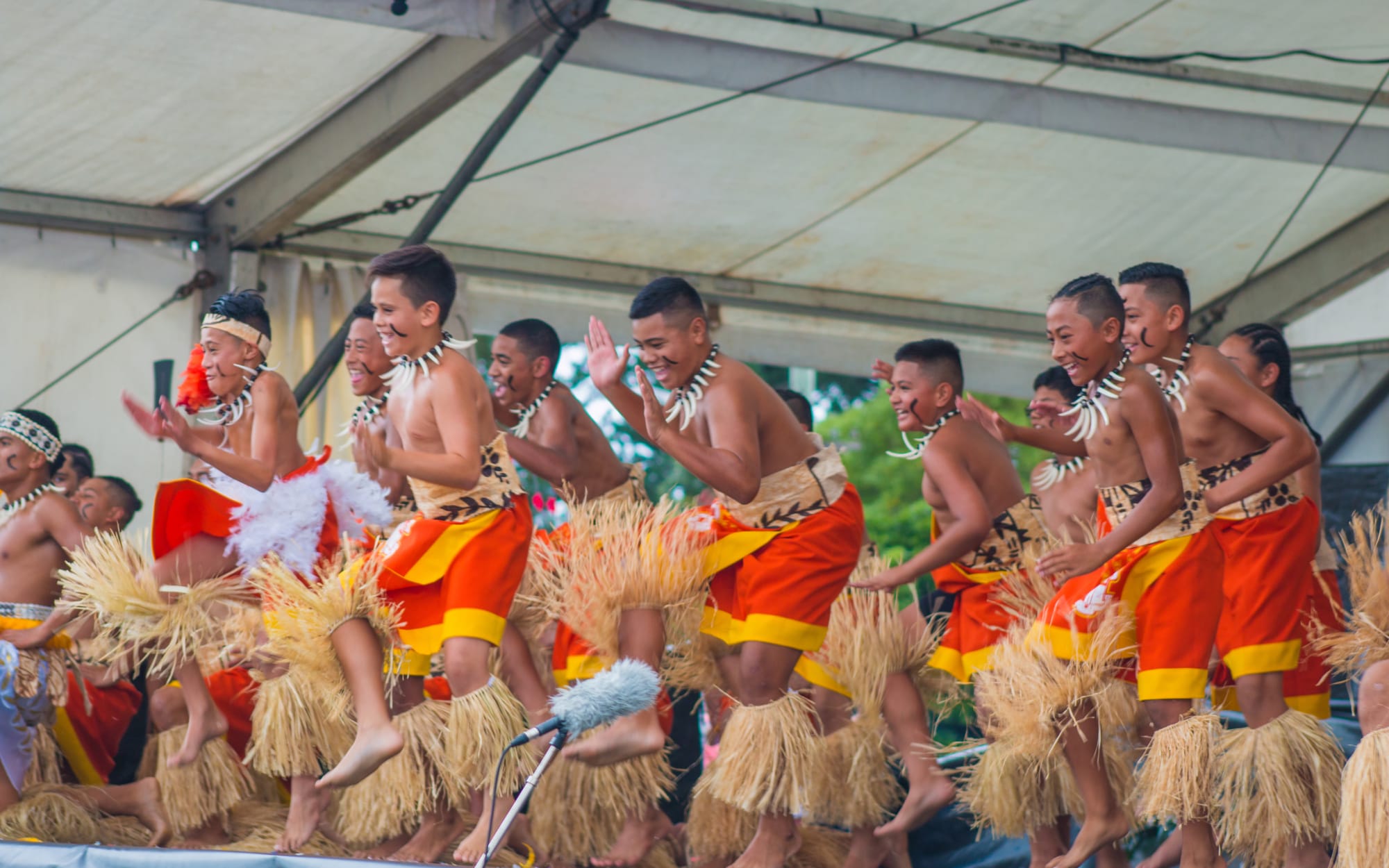In 2018, RNZ followed the St Paul’s College Samoan group as they sacrificed weeks of their lives to compete for Polyfest glory. 'SEVEN WEEKS: Journey to Polyfest' is a documentary about family, pride, community and culture, hard work and an honouring of history:
While most are shaking off the summer holidays at a slow, yawning pace, a group of Auckland secondary school students are beginning the year with seven weeks of relentless training; memorising dance moves that require athleticism and grace, songs that combine power and harmony. Muscles will ache, voices will go hoarse, bodies and brains will fatigue in the quest for Polyfest glory - the largest Pacific dance festival in the world.
St Paul’s, a small Catholic boys’ school in the gentrified suburb of Ponsonby, has a school roll of mostly Pacific Islanders. Its students, over the years, have built the school a reputation of excellence at Polyfest. The St Paul’s Samoan boys’ have claimed the title of 2017 champions. They speak often of this win. They carried that weight, that want, into 2018.
Last year, Leilani Momoiseā, Claire Eastham-Farrelly and Laura Tupou followed the group over seven weeks as they prepared for Polyfest, seeking to once again claim victory. Leilani Momoiseā recalls this journey [spoilers below] :
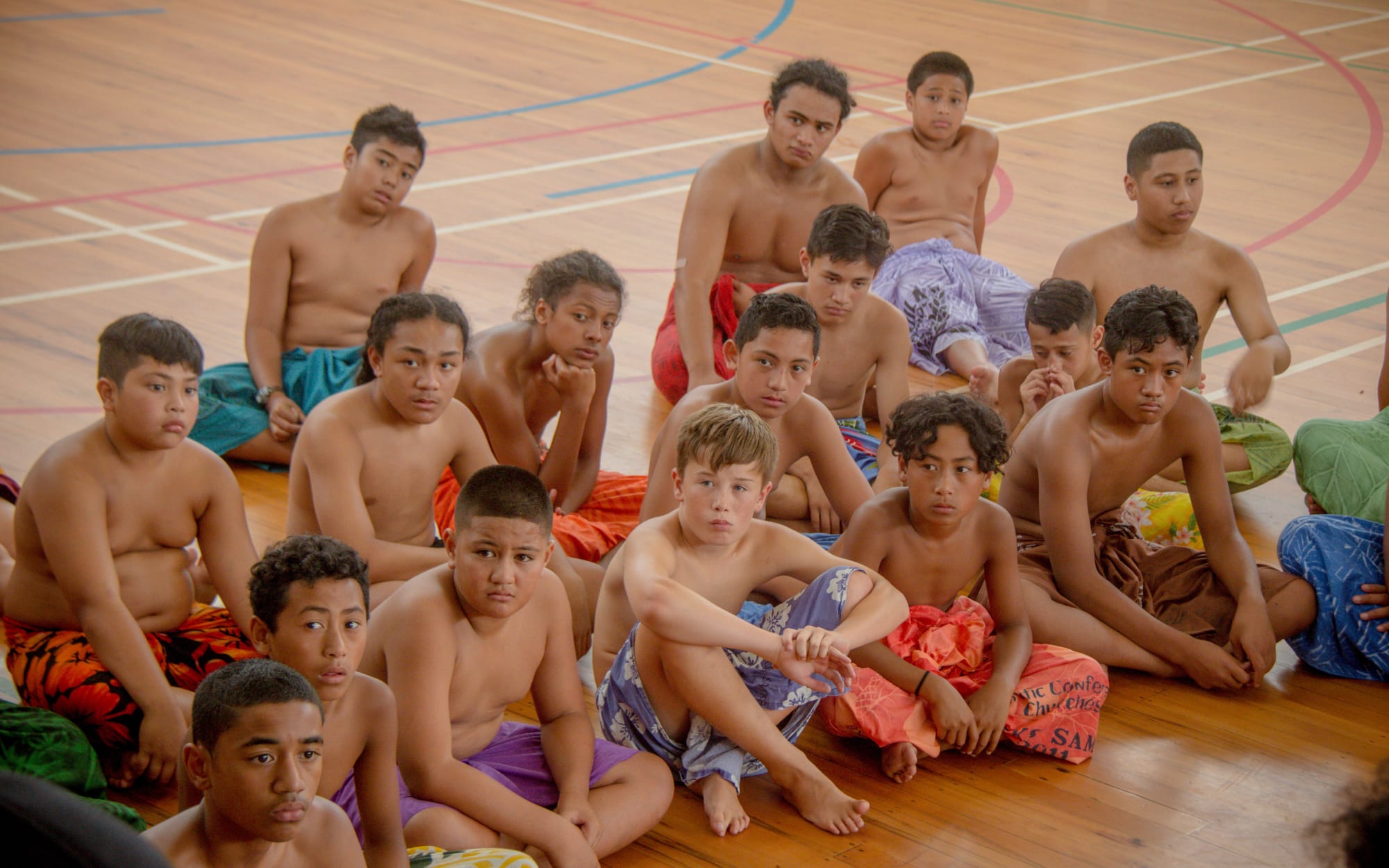
St Paul's College Samoan group meet for Polyfest practice in 2018. Photo: Penina Momoiseā
E tūmau le fa’avae ae sui le faiga - The way we practice evolves, but the foundation remains the same.
In their first practice of the year, about 50 teenage boys sit cross-legged in their lavalavas on the school’s gym floor. The contrast in size and age between the senior and junior boys is amplified as they squash together to form a semi-circle. The school is so small they must draw on year seven and eight students, as young as 10 years old, to make up numbers. Leaning forward with necks craned, they listen as tutor Cess Wally Uale tells the handful of first-timers that they’re in for a fun journey over the next seven weeks, but adds “It’s gonna get hard, I’m not gonna lie.”
Those first few hours provide a small sample of the constant repetition they will endure. Carefully sounding out Samoan vowels and words, learning songs by singing one line at a time, and then again, and then some more, and only when Uale is satisfied will they move on to the next line.
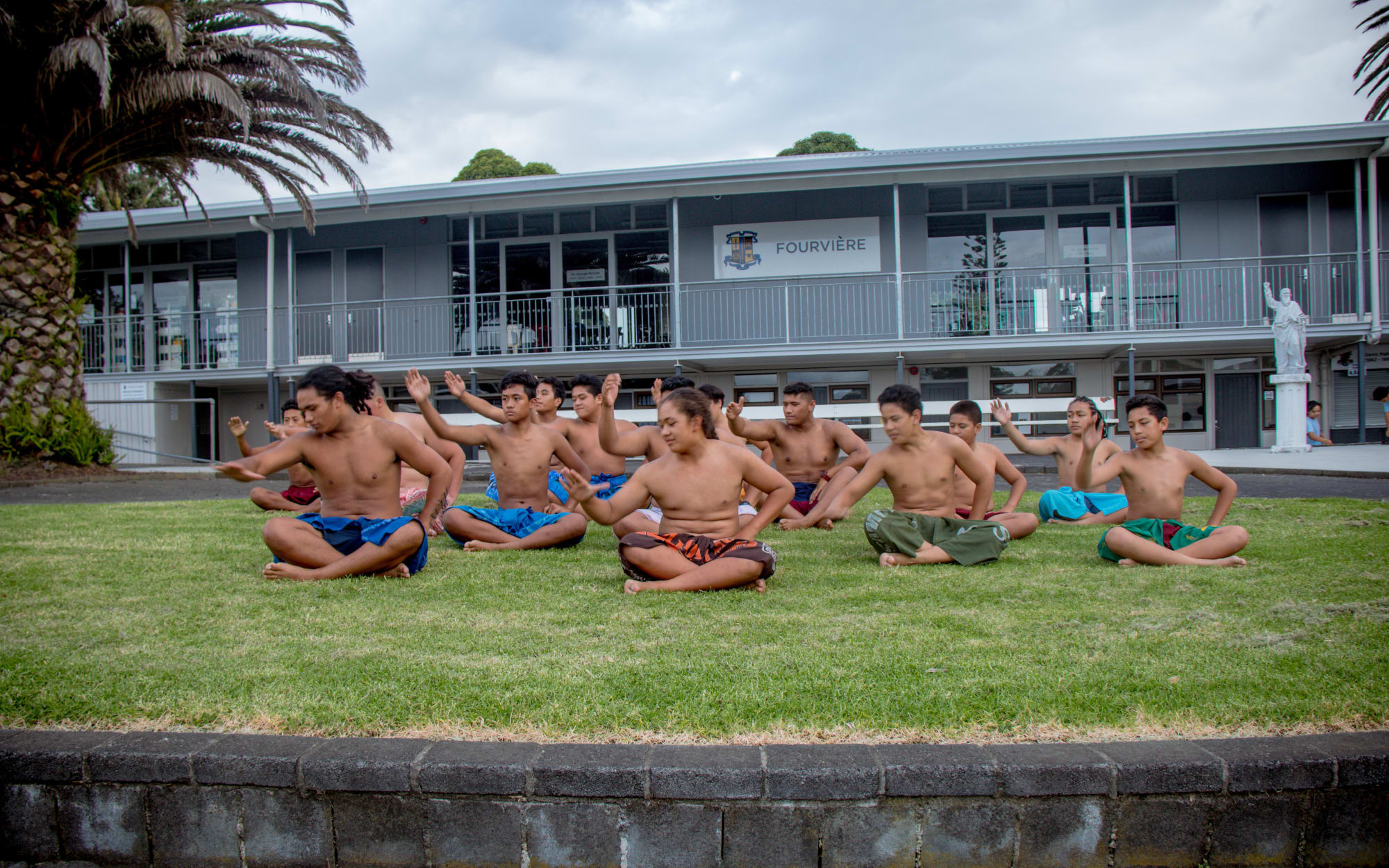
The St Paul's College Samoan Group practice outside for Polyfest. Photo: Penina Momoiseā
Part of the judging criteria for Polyfest is correct Samoan pronunciation. Most of the boys are New Zealand- born Samoans, and most do not speak Samoan fluently. Uale must be vigilant.
“Obviously if the judges can’t understand what you’re saying then they can’t mark or give you top points.”
Each year, an overall theme is set for Polyfest, and the groups must incorporate this into their 20- minute performance. These first practices they work on their Ulufale, or entrance.
“Ulufale is where we start our performance, where we address the crowd, the judges,” says head tutor Albert Tupuola. They want to highlight the graceful Samoan siva, and then fuse it with the drumbeats and singing. “We’ve gone back traditional, where you can start slow and then pick up the pace.”
The older boys, many of whom have entered Polyfest multiple times, are expected to set an example for the juniors. Year 13 student Toma Futi surveys the group, urging them to stop fidgeting, to sing louder, to pay attention, to have more energy.
2018 is his seventh and final year of competing in Polyfest. “It reminds us that there is a beauty within our culture.”
Year 12 student AJ Tuipe’a, in his sixth year of competition, also acts as a leader within the group, aware that the younger students are looking to the seniors as he once looked to others. Polyfest is intense, he says, and juggling school, sports and church commitments is tough.
“Especially with all the senior boys who are dealing with NCEA. It’s kind of hard at times to try and balance Polyfest and then your education as well, try and get those credits.
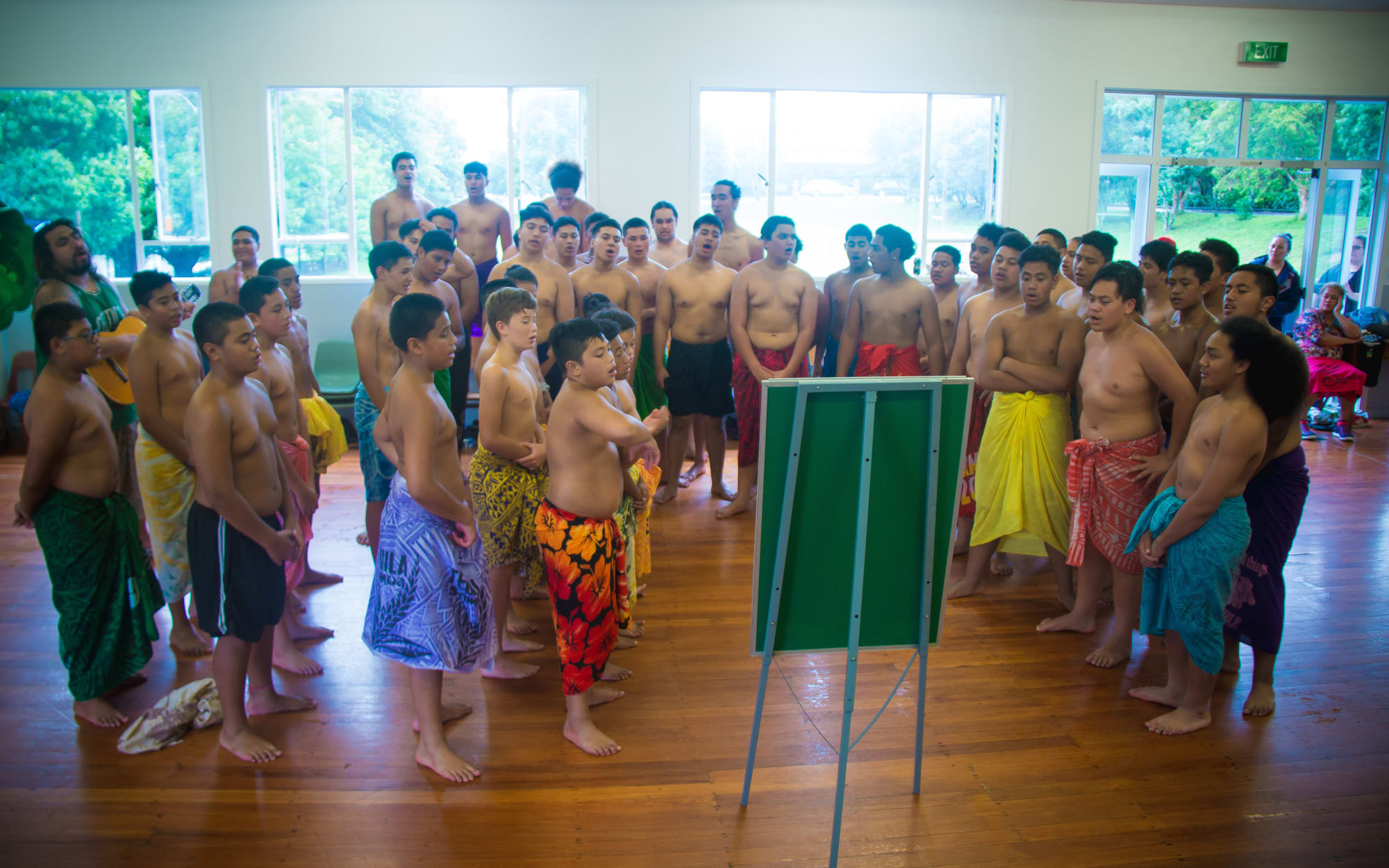
St Paul's Samoan group learn the Pese o le Aso section in one of their first Polyfest practices. Photo: Penina Momoiseā
“The teachers wanted more out of students. Stop using Polyfest as an excuse.”
In a room behind the gym, a group of parents meet to discuss practice times and fundraising. The Samoan group parents’ leader, Ianualio Savuvao-Va’auli, stresses to them the need for 100 percent buy-in not just from the kids, but the parents as well.
“There’s a massive commitment to the group, but also we don’t want it to affect their academics. Because their academics is the be-all and end-all.”
The St Paul’s dean of student welfare, Kalolo Matt To’ua, is all too aware of how easily schoolwork can fall by the wayside during Polyfest preparation. Most students commute to the city from South Auckland, and Kalolo knows how exhausting practices and travel times can be.
“Students will come in the next day with no homework completed. So it’s hard on teachers. The teachers wanted more out of the students, stop using Polyfest as an excuse.”
In previous years teachers took more of a leadership role in Polyfest, but that changed with the arrival of a new school principal, Kieran Fouhy. In 2016 Mr Fouhy canned participation in the competition because he believed class work wasn’t being prioritised, that Polyfest and rugby league were valued higher than academic achievement.
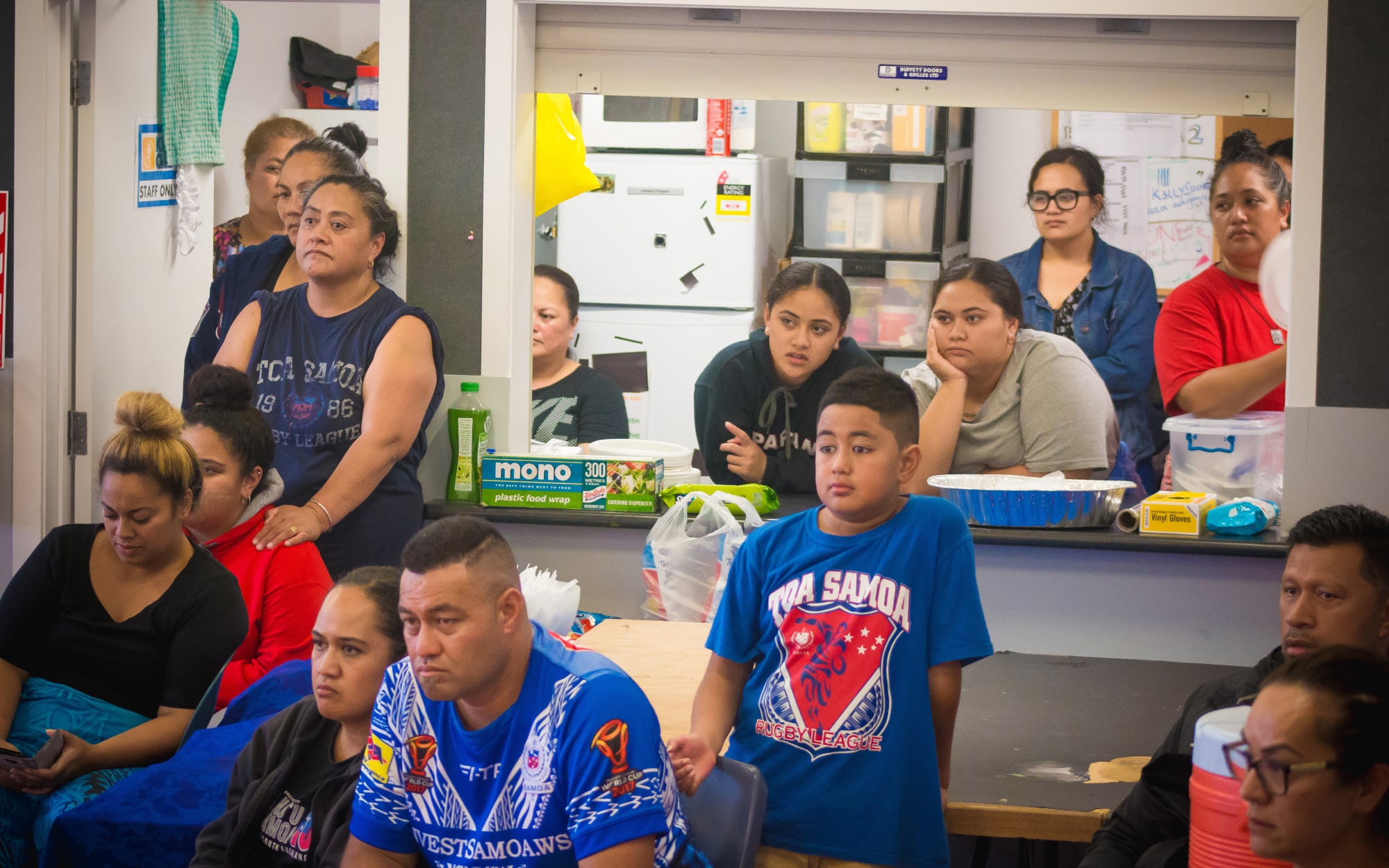
Parents and family watch on as their sons practice for Polyfest. Photo: Penina Momoiseā
His decision was contentious, but students and parents were told if school results improved, they would be allowed to enter the next Polyfest. “Our results were excellent that year, lifted up just like that. We noticed a lot of boys who didn’t treat the classroom properly - they left - which is fine by me,” says Mr Fouhy, whose aim is for every boy in Year 13 to get university entrance.
“University Entrance for our seniors is 73 percent, and the national average is 47 percent. It was a clear indicator to me that they’ve actually got the message.”
The green light to compete again came with new rules and restrictions. Practice times were cut short, overnight practices, or ‘sleep-overs’, were no longer allowed, off-site venues had to be hired when the school was unavailable, teachers were told to step aside from their roles in Polyfest and parents were asked to step up. Students, meanwhile, were warned if their academic results went down, Polyfest would once again be pulled.
It made winning in 2017 all that much sweeter.
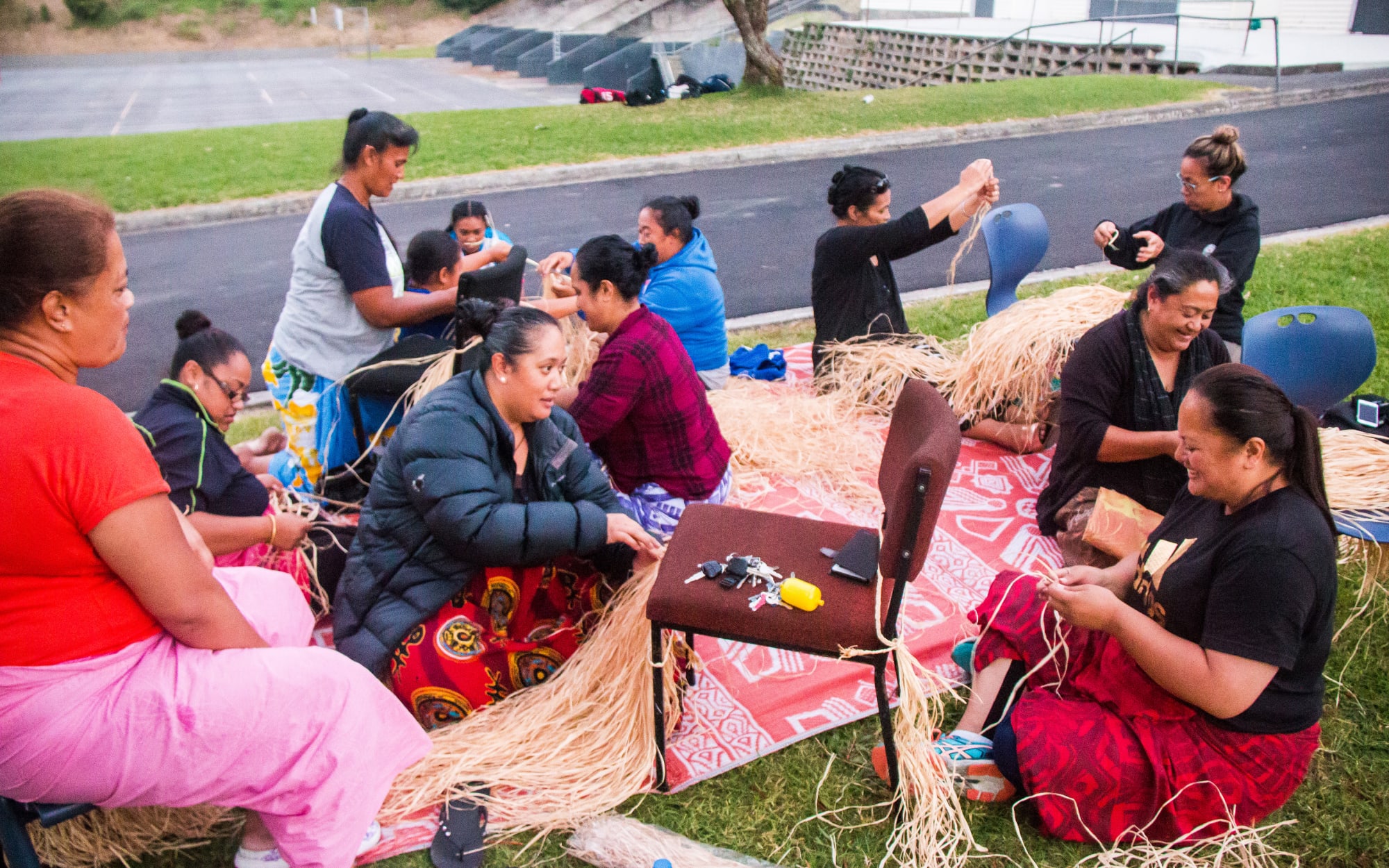
Mothers of the St Paul's College students hang out together while they make their son's Polyfest uniforms. Photo: Penina Momoiseā
“I wasn’t born in Samoa. So that connection is gone. It’s about keeping our culture alive.”
“We had a lot of hurdles last year. So many compromises between us and the school … So just to win it, it was a sense of pride in our young ones,” explains St Paul’s old boy and parent Frank Fuimaono.
The community of parents is strong and organised, and their passion for what Polyfest brings to their lives is palpable.
“I wasn’t born in Samoa. So that connection is gone,” says Fuimaono. “St Paul’s has a big history of Polynesians. Even though we’re in a community of majority Europeans the big push for Polynesians is to keep our culture alive.”
Parent and catering coordinator Vine Tu’ua Tautele lays out fruit and snacks on a table ready for when the boys need to take a break.
“It’s for my son to learn about his culture, and to learn the language as well.” Her eyes brim with tears as she speaks of her son. “Because he’s New Zealand born and he’s, I would call it, ‘broken Samoan’. So with our Samoan group it really helped him to learn the language.”
“You feel proud. Of what you do, and what you’re doing,” says student Pete Iosefa Mase. “It’s just like playing rugby and winning the World Cup. That’s what Samoan group is like.”
Richard Ott, in his last year of high school, is one of the few students entering Polyfest for the first time. “I’m learning heaps about Fa’a Samoa ways and the way you live life as a Samoan person. It’s an unreal experience.”
For Year 13 student Khyren Leau, Polyfest affirms his identity, “Everyone doesn’t think I’m Samoan. When I hop on stage, then everyone knows.”
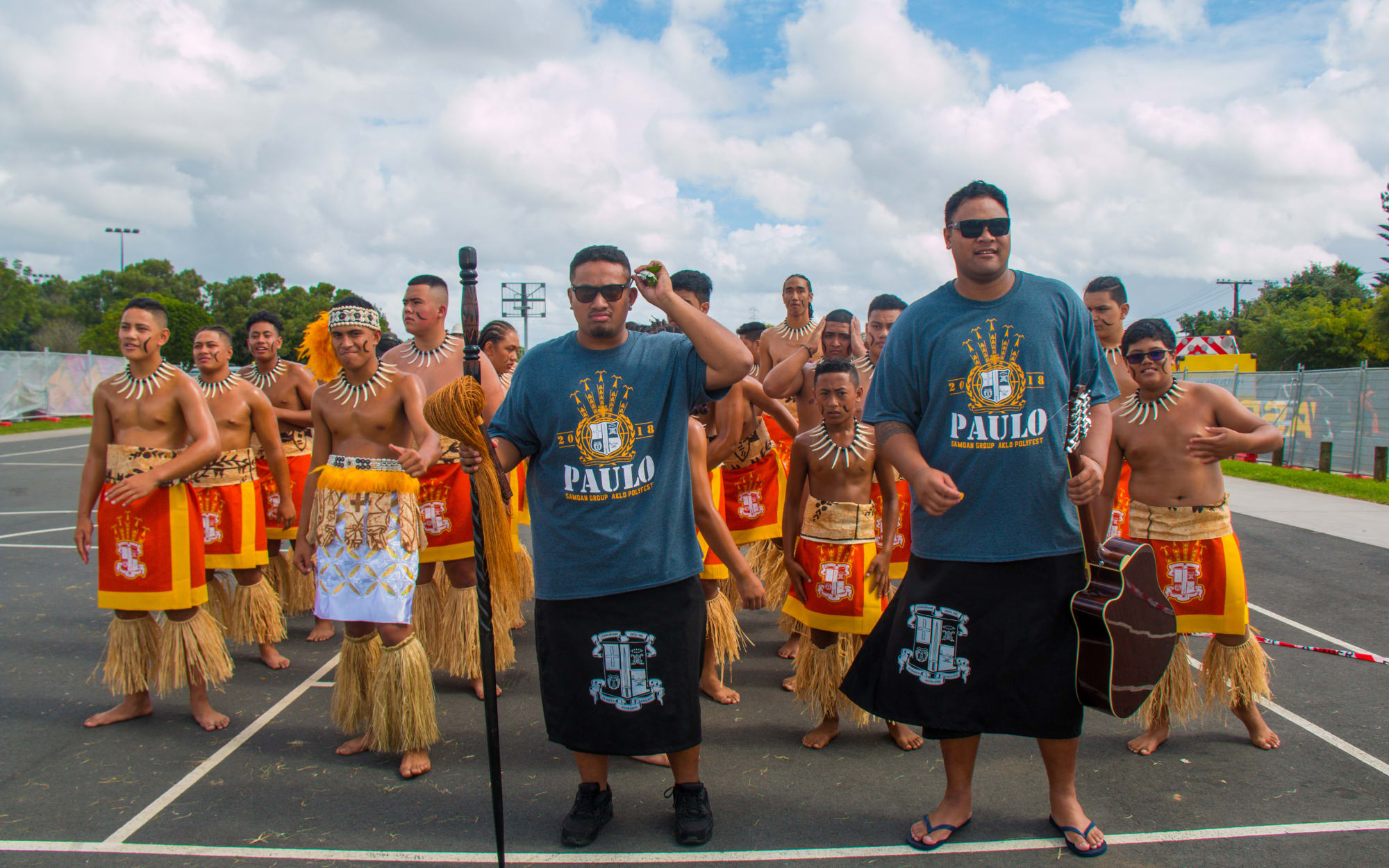
The St Paul's Samoan group, and tutors Francis Tanuvasa and Joe Alesi, wait to go on stage to compete at Polyfest. Photo: Penina Momoiseā
O le ala i le pule o le tautua - The pathway to leadership is through service.
Practices begin three days a week after school, then over the weekend, and the closer Polyfest gets, the longer practices go into the night. A lot of effort is paid to the Pese o le Aso section, which carries the most points, and where the theme will be highlighted through a number of songs.
“Samoan singing is different to just your average choir, the sound is different,” says Cess Wally Uale as he looks over to his father, Fauena Fiapule, teaching the group a new song. Fauena points his index finger upwards as his voice reaches soprano pitch. He communicates to the boys only in Samoan and hand gestures.
Songwriting is Fauena’s specialty; it’s what he’s known for in the community, and he has taught alongside Cess since they began tutoring St Paul’s in 2013, “No matter where I go, I always take my old man with me. I’m like his little shadow,” says Uale before quickly correcting himself, “His big shadow.”
To the tutors’ frustration, there are a large number of the senior group who are absent from crucial practices due to school leadership camps. It’s hard on the tutors, who sacrifice a large chunk of their time to teach the group.
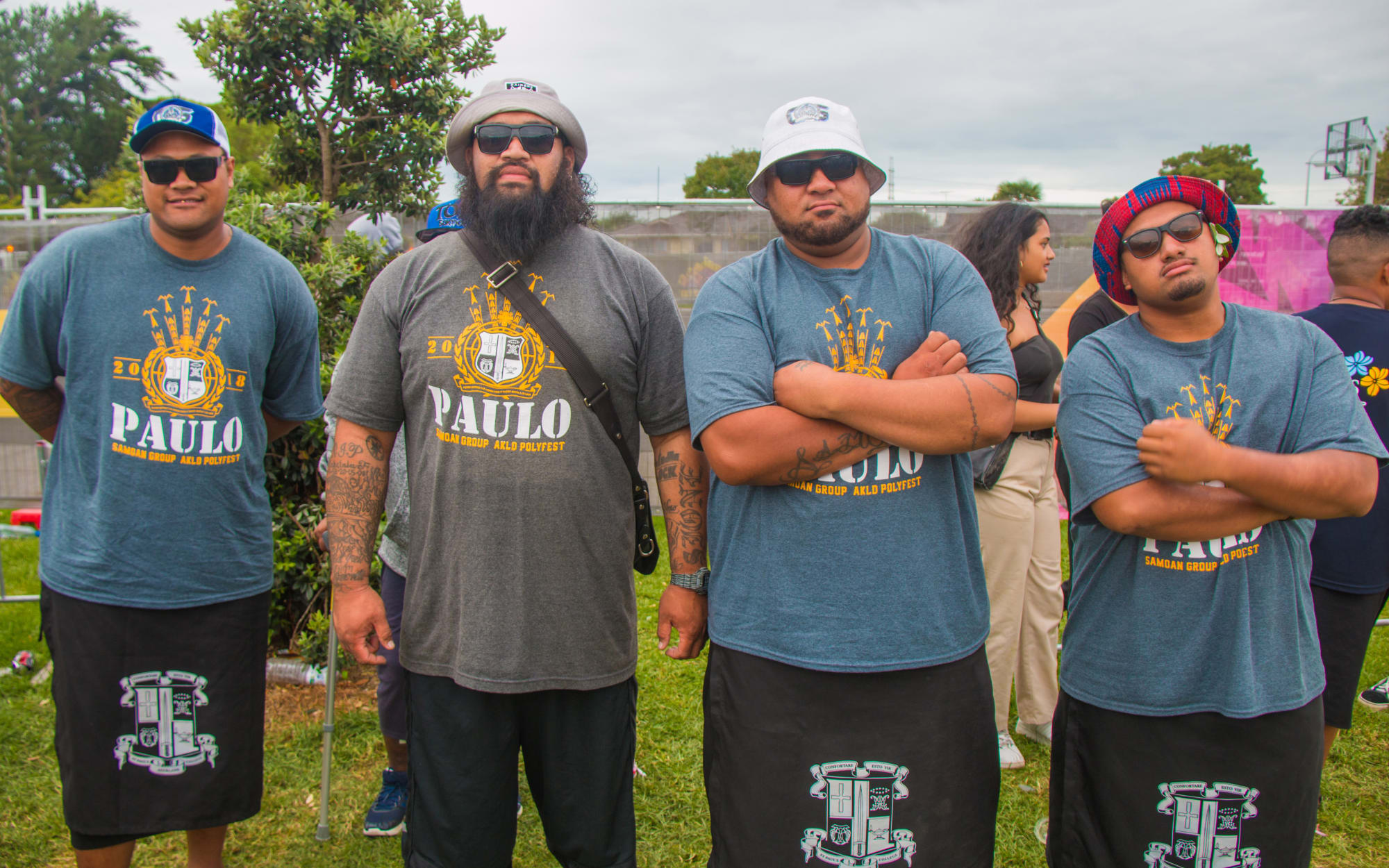
St Paul's College Samoan Group tutors: Joe Alesi, Cess Wally Uale, Paki Alesi, Francis Tanuvasa. Photo: Penina Momoiseā
Albert Tupuola provides for his family both in New Zealand and Samoa, he has church commitments, a renowned dance group Tatau that he performs with every week, a new job, is newly married and has recently learned his wife is pregnant.
The dance routines he teaches are high-energy, elaborate and challenging. “It’s a young group, so practicing my father skills already … We’re short of time, to be quite honest. The stuff that I teach, it gets difficult.”
The most exciting, and complex of these routines are the Sāsā and Fa’ataupati. “Sāsā is a traditional dance that requires mostly sitting down, where you depict a lot of Fa’a Samoa chores inside the routine … expressing how you would do fe’aus, chores in Samoa, and that Samoan way of living.”
These actions include killing mosquitos while you’re working, climbing the coconut tree to pick coconuts, cracking open and scraping the coconut, preparing and tasting kava, rowing the canoe and rolling up the sinnet.
The Fa’ataupati - or slap dance - is described by Tupuola as a war dance, only performed by men.
“Samoan males, expressing how strong they are, expressing their strength and capabilities in the Fa’a Samoa. It’s also a war dance to send a message to other boys schools.”
“They will do the same to us, and it’s something we accept with respect. So it requires a lot of energy, a lot of jumping up, a lot of falling down, rolling everywhere.”
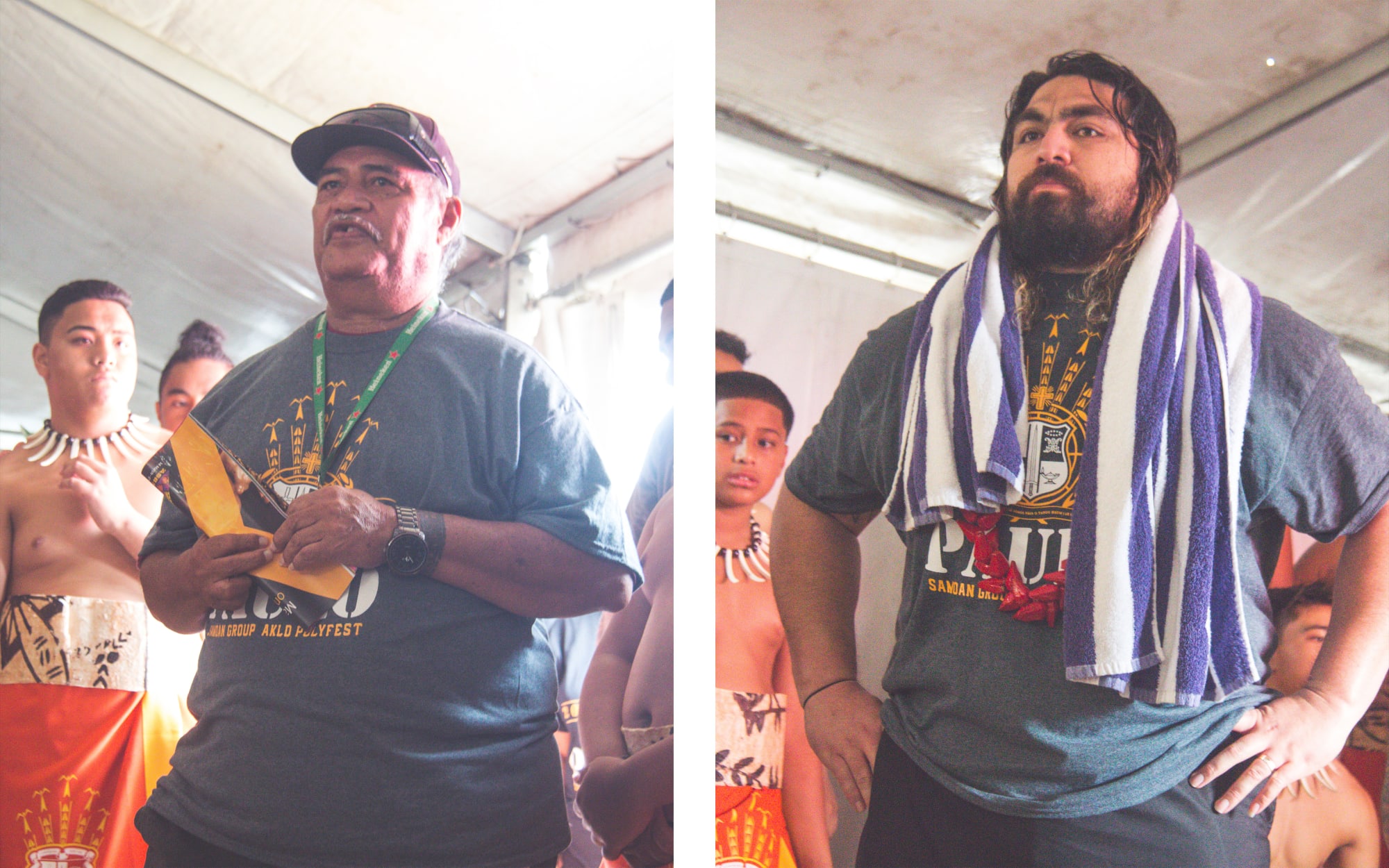
St Paul's College tutors. Pese o le Aso tutor, Fauena Fiapule (L) and head tutor Albert Tupuola (R) Photo: Penina Momoiseā
On a particularly trying week, four weeks before Polyfest, the boys are not picking up the actions as quickly as they should, or need to. Practice is halted. They’re separated into smaller groups, moved outside, one tutor per group, to go through the routine in stops and starts, sharpening each movement until that repetition becomes muscle memory.
On this day, Cess Wally Uale questions the students commitment. “I don’t know if they’ve got a lot of things going on, but their attitude isn’t right.”
The group this year gets bored easily, says Uale, “I don’t think these boys know that we’re taking our time off work to come here for practices … I’m not getting my full weeks pay. You know, I’m falling short on pay week.”
But the school means a lot to them, and they want to give back to the school. Tutoring the Samoan group is their way of doing so.
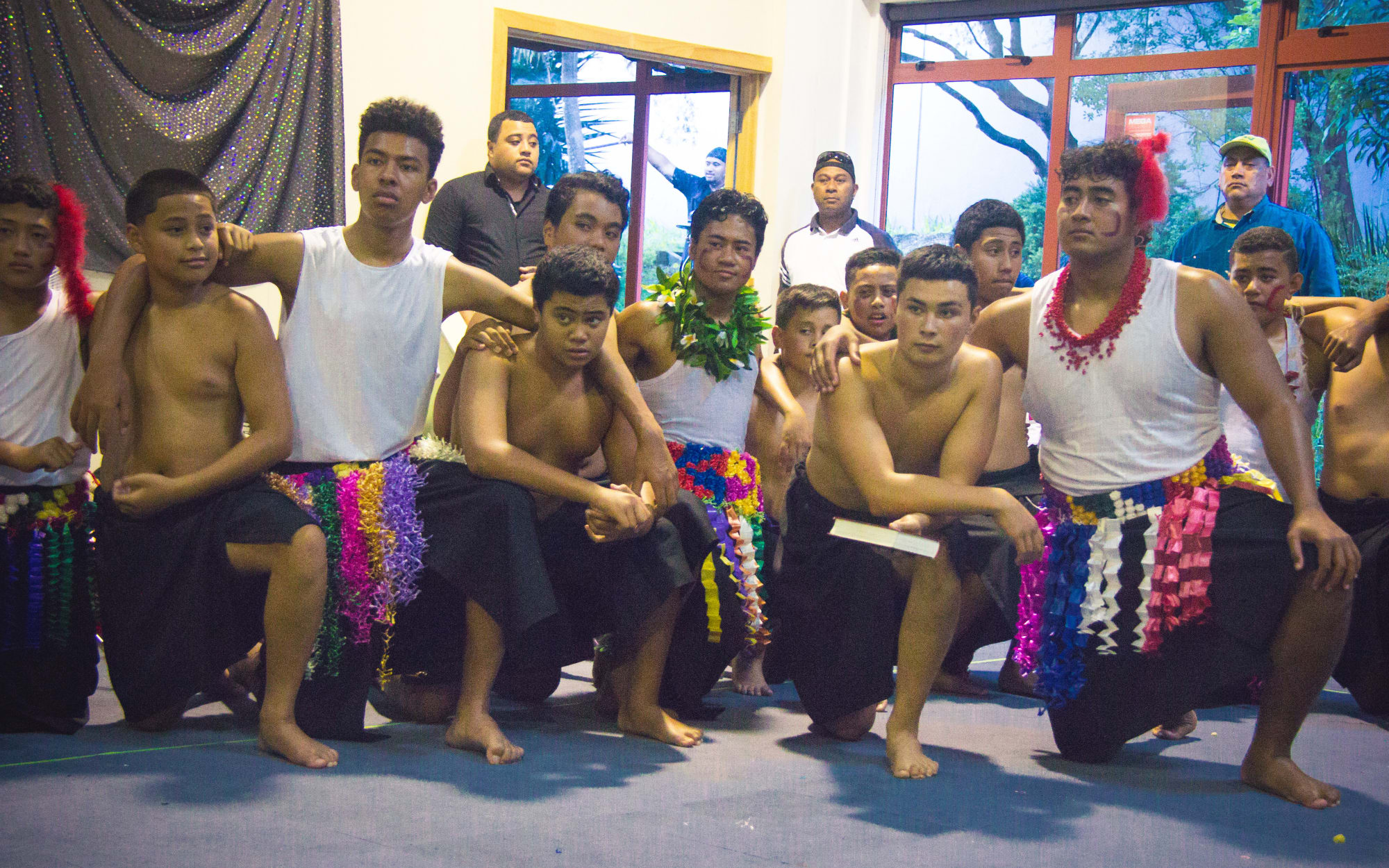
The St Paul's Samoan and Tongan groups gather together after performing at Fiafia night. Photo: Penina Momoiseā
“Just as much as I’ve done for other people’s sons, they’ve done for my son too. They fed him when I couldn’t feed him.”
Most parents are reluctant to discuss the financial impact of Polyfest. In 2017, uniforms alone cost the group $1300. On top of that, there are transportation costs, the cost of feeding the group every practice, and if they need to book a venue outside of school for practices, they pay to cover that too. They try to make it clear that families should only give what they can afford.
“It’s not cheap,” says Vine Tautele. “It’s a stressful thing for our family, we have to sacrifice things for them but in the end we want to give our best for our boys.”
Lele Tanoa’i says while there are the personal sacrifices of time and money, the larger community benefits as a whole. “Sacrificing our family time, but we’re actually with our bigger families. Financially, we’re also feeding our bigger families. So, we lose some, but we also gain.”
“You’re not just feeding your child, you’re feeding someone else’s child.” said Elaine Kurene. Her son has finished his schooling at St Paul’s, but she returns to help out, saying she enjoys the family feeling she gets at the school.
“Just as much as I’ve done for other people’s sons, they’ve done for my son too. They fed him when I couldn’t feed him. This is my pay back to give to their sons, as much as they cared for mine when I wasn’t here.”
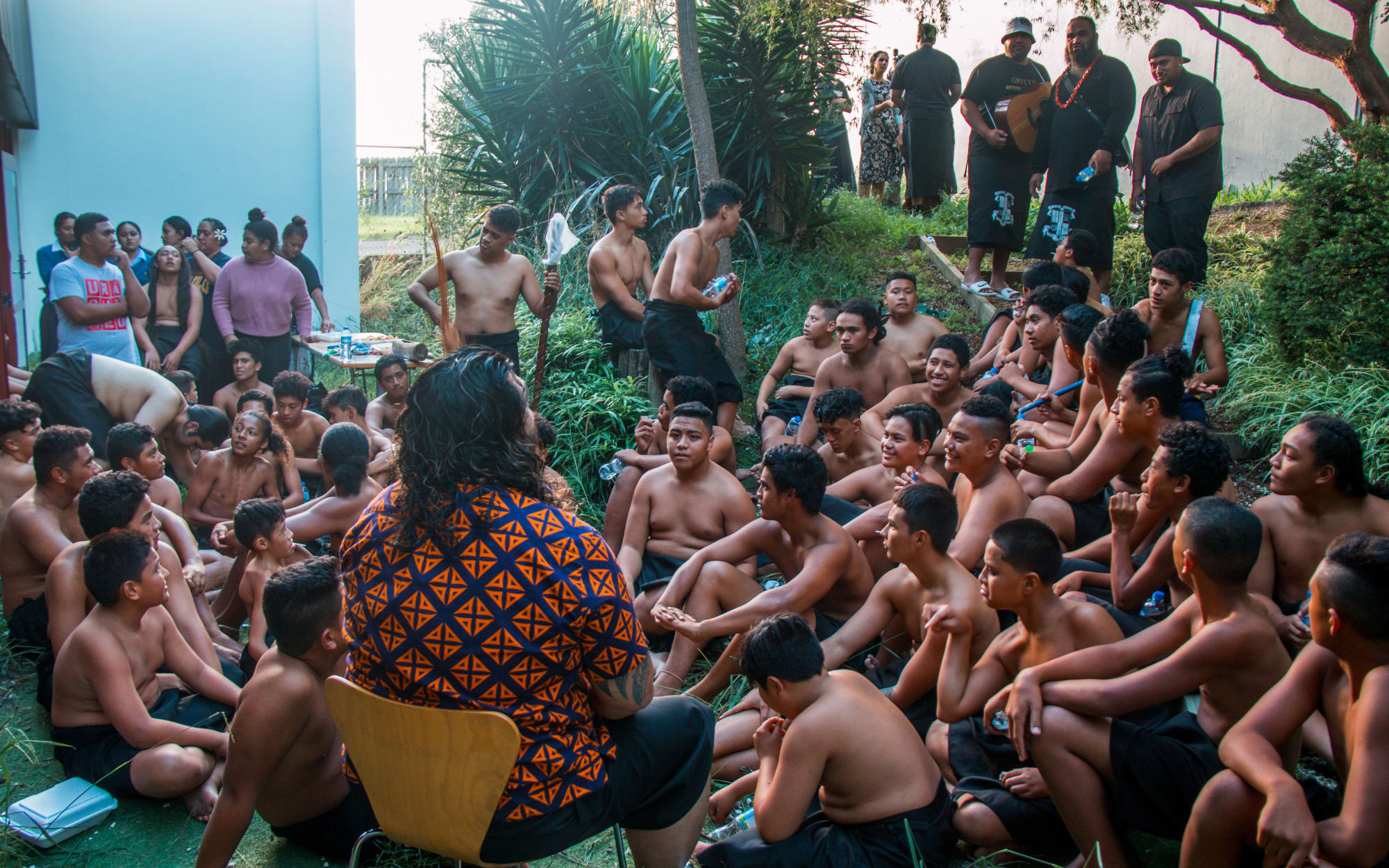
St Paul's College Samoan Group have a pep talk before they perform at Fiafia night Photo: Penina Momoiseā
It’s a common theme from parents, tutors and students. They speak of community, of brotherhood, of family, and how this is all strengthened by Polyfest.
Student AJ Tuipe’a appreciates being able to talk to the parents who help out regularly. “I look at them as my own parents aye … they’re cool to talk to.”
For the second year in a row, AJ has been chosen by his peers to take on the role of the Fuataimi, also known as the conductor. He will take centre stage to conduct the group as they sing their songs during the crucial Pese o le Aso section. He is hyper aware of the importance of this role.
“If I miss a count, or if I miss a clap for the boys then that will take them off track and I will contribute to missing the opportunity to come first again for the pese’s. It’s a lot of pressure. Heaps of pressure.”
It is just one of many things he has added to his mental load - Friday late night practices followed by early morning wake-up calls for weekend cricket, schoolwork, church and youth-group commitments.
“To be honest, sometimes I just leave everything and just go to sleep. Because I’ve got too much on my mind … Sometimes I need to just go to sleep.”
AJ’s schedule is not unique. St Paul’s deputy head boy Daetyn Tanuvasa outlines a similar routine that balances schoolwork, sports and Polyfest. “I barely get sleep,” he says.
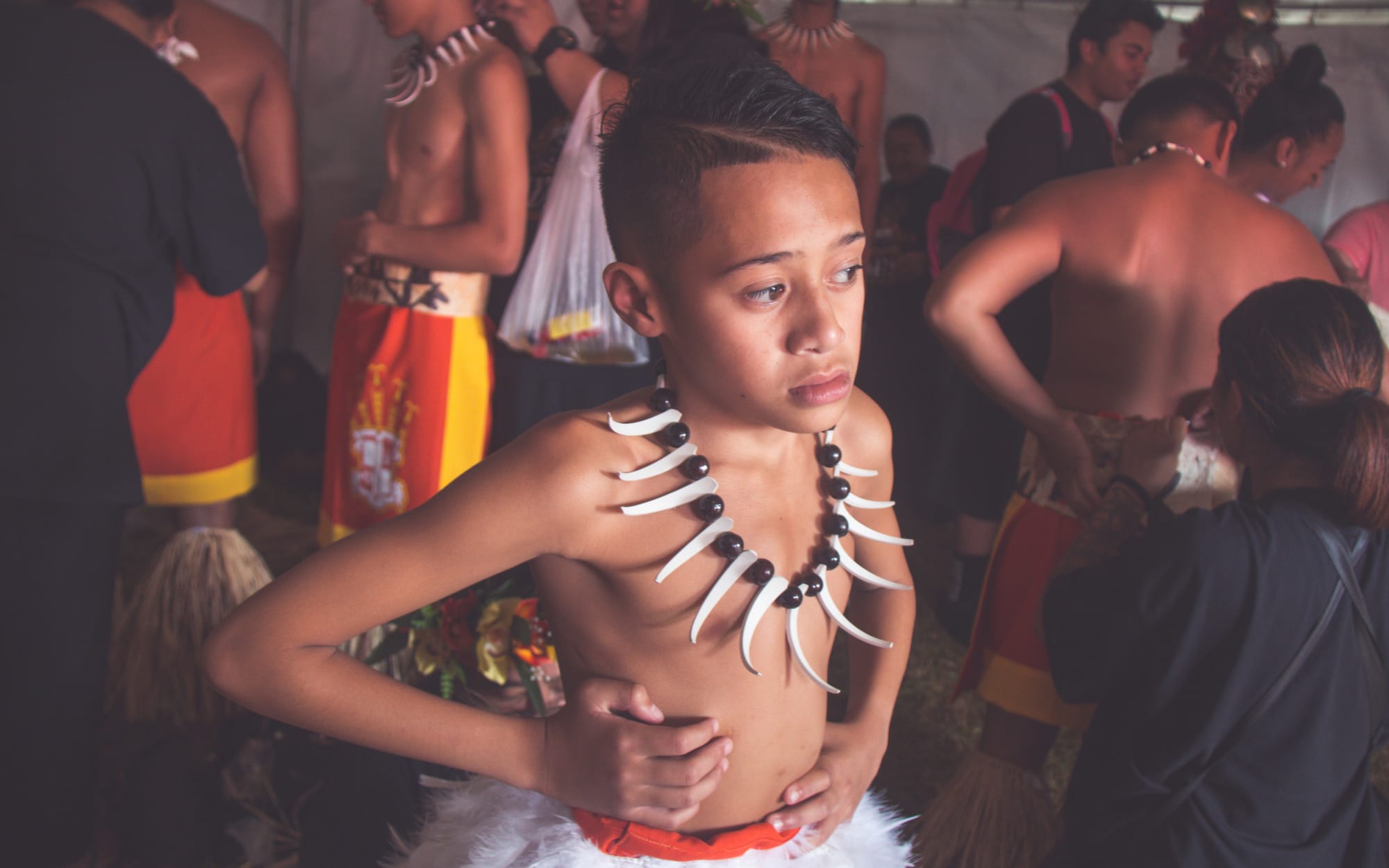
Saints Tuitama waits backstage as the St Paul's Samoan group prepares to compete at Polyfest. Photo: Penina Momoiseā
“That’s more important than Polyfest. Showing that to the people you love, rather than doing it for the scores and placings.”
Days before Polyfest, the group presents their performance in front of a crowd for the first time, in what’s known as Fiafia night. Fiafia night serves as an opportunity for the group to thank their parents, family and friends for the support they’ve shown throughout the weeks.
It also works as a dress rehearsal, the first real measure of how far the group has come. It is a time when the group can enjoy the performance without the burden of competition.
Saints Tuitama has a star role during the Sasa as the Fa’aluma - essentially the group’s hype-man, racing between the rows, twirling and doing the splits, lifting their energy and the energy of the crowd. His parents won’t be at Polyfest to see him perform, but they watch him at Fiafia night.
“That’s more important than Polyfest. Showing that to the people that you love, rather than doing it for the scores and placings.”
The routine is filmed, and will be dissected the next day, identifying the weak spots, fine-tuning the timing. Trying to perfect as much as possible before the big day.
“We’ve got a lot to work on, we’ve still got three days. Walk out these doors, stay humble, stay grounded. Don’t forget to thank your parents,” reminds Cess Wally Uale.
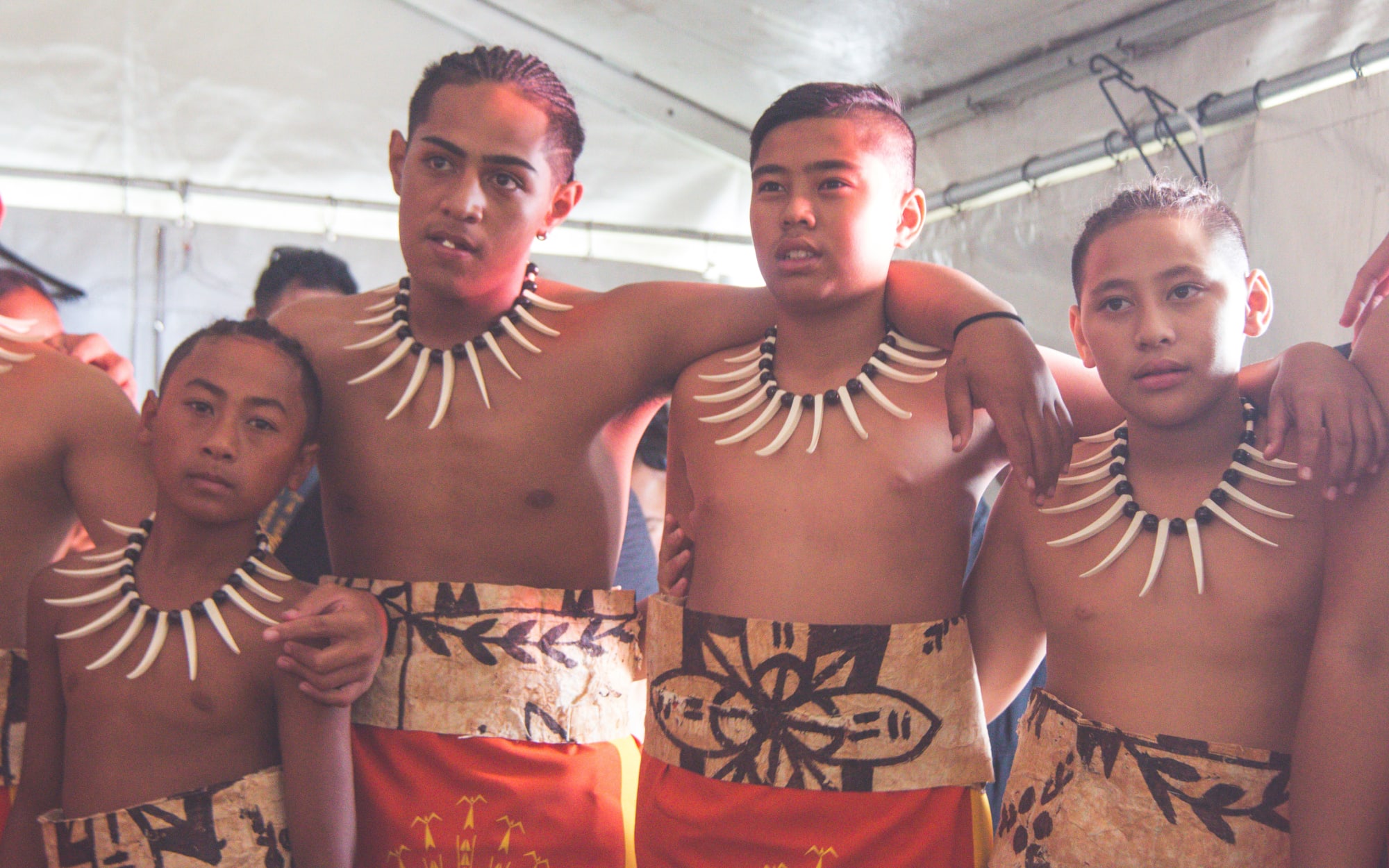
St Paul's College Samoan group students huddle backstage, just before they compete at Polyfest Photo: Penina Momoiseā
“This thing that we do, we don’t do it for fun, we work hard for it.”
Polyfest attracts more than 100,000 visitors each year, with more than 12,000 students taking to the stage over four days. On the Saturday of Polyfest, the main day of competition, traffic snakes slowly across multiple streets, the thousands making their way to the Manukau Sports Bowl in South Auckland. For the casual attendee, Polyfest is a day of stage-hopping, food and entertainment. For those competing, it is a long day of waiting. The fleeting rush of performing, tempered by anticipation and nerves.
Backstage it is calm, but tense. Parents fuss, as tutors try to gather the group one last time before they go on stage. Faeuna Fiapule steps forward. For the first time in seven weeks, he speaks to the boys in English.
“Work hard, do your best please. No mistake. Never mistake … Two months, and twenty minutes up the stage. Never mistake.”
The final touches are made, uniforms are trimmed, safety pins are stuck, black lipstick is applied to cheeks. Routines are quietly, nervously mimed. They each take a knee and pray. “Leave everything out on the stage,” Cess tells them. “I want you guys crawling off that stage when you’re done.”
With each step they take up to the stage the size of the crowd becomes clearer, and as they fill the stage the cheers become louder. There is a moment of stillness, heads are bowed, deep breaths are taken, the crowd hushed for a moment before the opening drum beats kick in. In unison they raise their heads, their smiles wide. They sing, they dance, the crowd roars with delight.
Twenty minutes later, it’s all over. Out of breath, sweating and exhilarated, they march off stage. They pose for photos, hug their parents, their parents beam with pride. Seven weeks of unrelenting work has reached its conclusion. Have they done enough? Can they once again claim victory?
While the younger boys revel in the afterglow of the performance, senior boys nervously wait backstage, sitting through the drawn out judging process, the performance broken up into several sections, and a placing given for each section.
Awards are announced, the prizes for Ulufale and Ulufafo, entrance and exit, are announced. St Paul’s are expectant, but the school’s name is not called out. They have missed out on placing in the first two sections. Worry sets in. Whatever nonchalance existed, is now gone. Then, St Paul’s gathers a string of wins. First in Sāsā, Fa’ataupati, Taualuga and the top prize for best uniform.
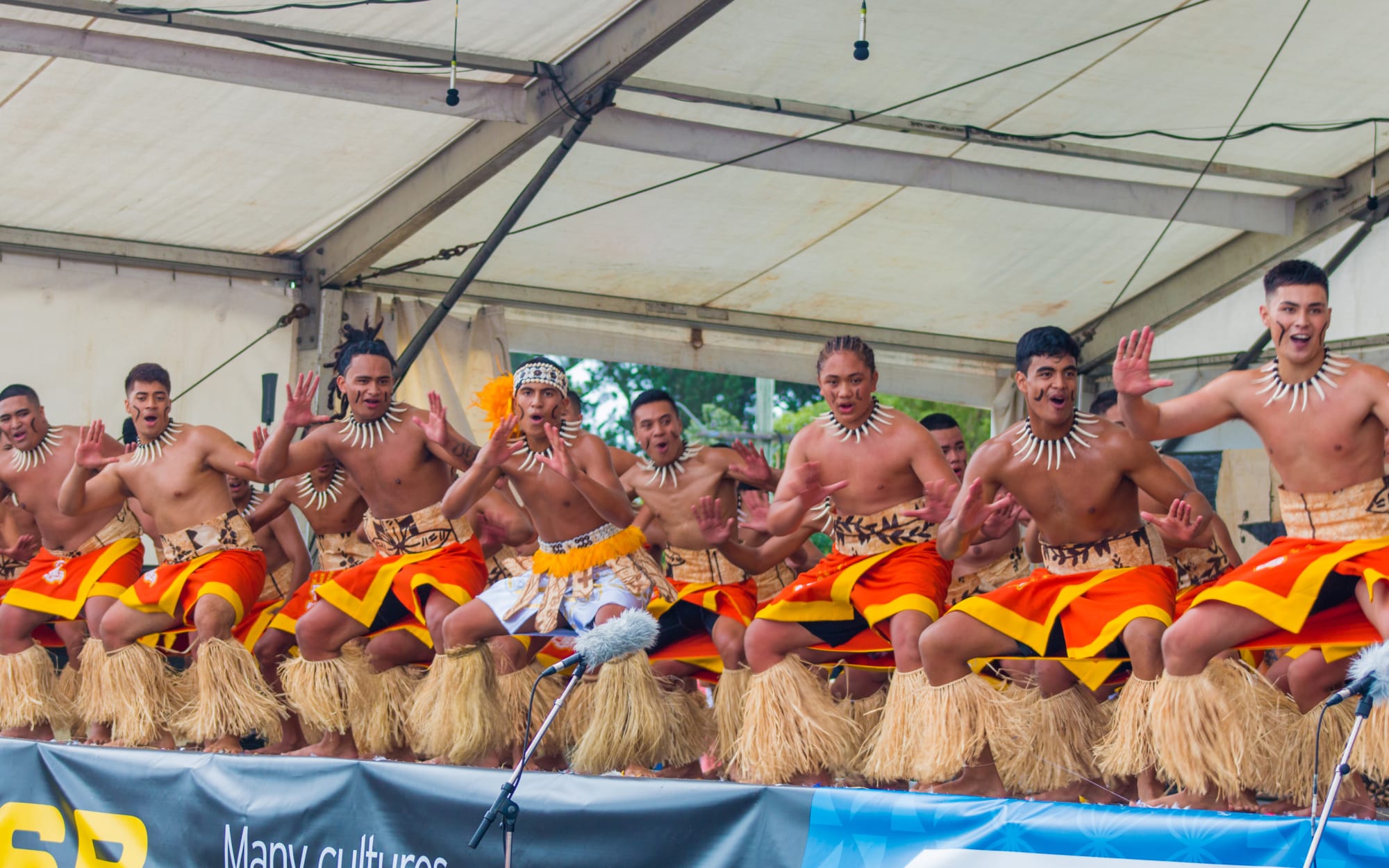
St Paul's College Samoan Group perform at Polyfest, 2018 Photo: Penina Momoiseā
But, in the weighted Pese o le Aso section, the section worth the most points, they have placed third.
They wait for the overall results, wondering if they’ve done enough to scrape through with the win again. Trying to do the math, worried that they may not even place at all. Over the loudspeaker the results come through. De La Salle, third. St Paul’s, second. Second. They have fallen just short of what they were aiming for.
They will later learn from judge’s notes that their singing was not loud enough, causing them to miss out on crucial points in the Pese o le Aso section, nor did their voices carry through in the Ulufale and Ulufafo. But in this moment, they don’t know what they’ve done wrong, what more they could have done to place first.
Their second placing still sinking in, they can’t hide their disappointment. Walking off-stage, they huddle together in a group, one drops to his knees, the rest interlink their arms, holding each other up. Through their tears, they sing, comforting each other. In the background, Kelston Boys’ High School celebrate their first place win.
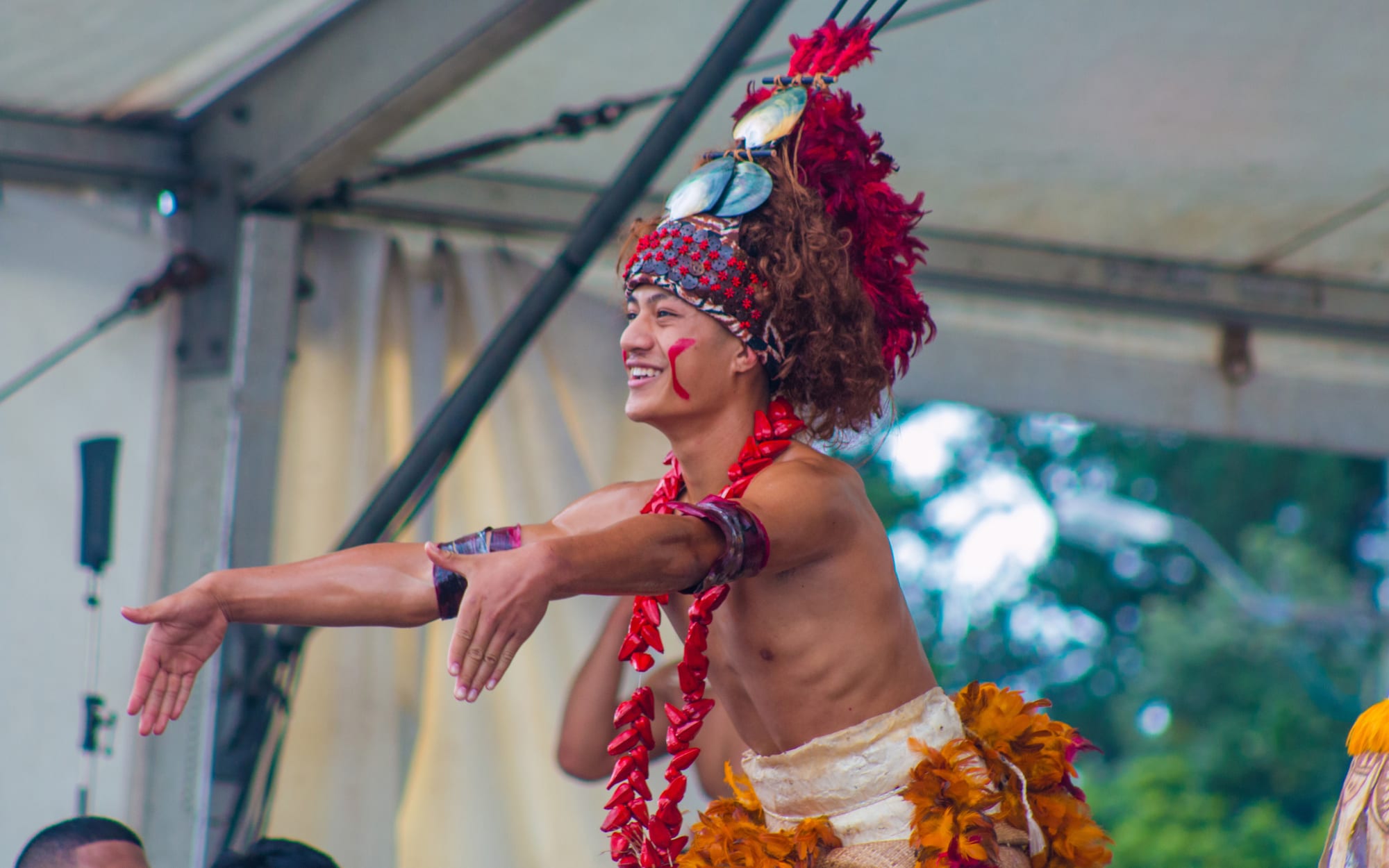
Shepherd Vili performs as the Manaia for the St Paul's College Samoan Group at Polyfest, 2018. Photo: Penina Momoiseā
Ma'au i lou ofaga. Maua'a lou fa'asinomaga - Keep your identity alive to thrive.
The older boys gather themselves to join the wider group out front. Uale tells them to take a knee as he addresses the parents. “On behalf of our team, our tutors, I’d just like to say a big thank you to our parents. You guys have stuck it out for us in the last seven weeks. Thank you for everything, and God bless you all.”
They walk over to the Kelston Boy’s group, a long line forms and they shake hands, congratulating each member on their win. “Just gotta tell them to stay positive, you know.” says Uale. “Things happen in life. No matter what they go through, there’s going to be barriers, things that’s going to bring them down. They just gotta learn to keep their chin up. Keep their heads up, and keep striving.”
The St Paul’s group were competitive. They wanted to win. They expected to win. But spend any time with the students, parents, and tutors involved and they will all tell you, stress to you, Polyfest is more than just a competition. It is more than song and dance. It goes much deeper than that.
“It’s something that has a lot of history and love and respect.” says year 13 student Richard Ott, as he reflects on what he hopes others could learn about Polyfest. “This thing that we do, we don’t do it for fun, we work hard for it.”
“It’s almost impossible to find out where you’re headed in life, without ever reflecting back on where you came from.” AJ Tuipe’a says. He’s disappointed, but he smiles through it. “Understanding your culture, your roots and your ancestry is an important part of carving out your future.”
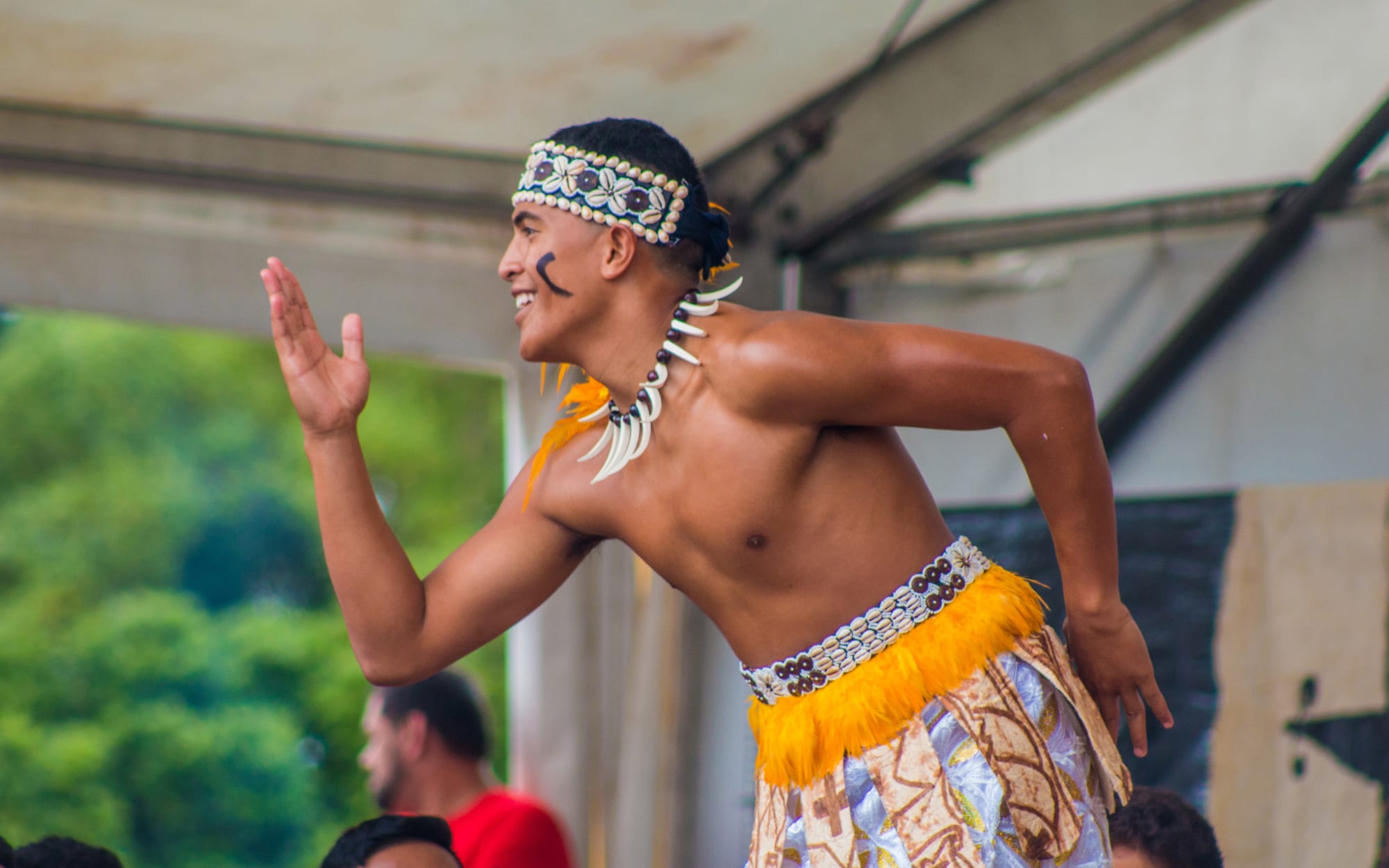
AJ Tuipea performs as the Fuataimi for St Paul's College at Polyfest 2018 Photo: Penina Momoiseā
Polyfest is about pride, history and belonging. For Samoan New Zealanders, a few generations removed from when their families first came to Aotearoa, Polyfest is one way to reconnect, one way they may hold on to their identity. For parents who did not grow up in Samoa, and for children who were not brought up in the Fa’a Samoa ways, Polyfest can fill those gaps, those holes of knowledge. It is a portal to their language and their history. A tool for their survival here.
St Paul’s Polyfest preparations for 2019 are currently underway. They have vowed to come back better and stronger.
“For us parents, the proudest moment is when they walk through the gym for the first time.” says Frank Fuimaono.
CREDITS:
NARRATOR: David Dallas, DIRECTOR: Leilani Momoiseā, CAMERA OPERATOR & EDITOR: Claire Eastham-Farrelly, SOUND MIX: Rangi Powick, ADDITIONAL REPORTING: Laura Tupou, POLYFEST DAY CAMERA: Luke McPake, STILL PHOTOGRAPHY: Penina Momoiseā for The Coconet TV.
Additional Footage courtesy of The Coconet TV.
With thanks to Pafelio Momoiseā, St Paul's College teachers and parents and the St Paul's Samoan Group 2018.

St Paul's College Samoan Group after performing at Polyfest 2018 Photo: Penina Momoiseā
